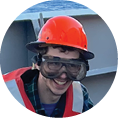Diving into ocean data: Meet the NDSF data team
The National Deep Submergence Facility-home to Alvin, Jason, and Sentry-is more than just an innovator and operator of underwater vehicles. It also manages data collected by those vehicles. And that adds up to a lot of data.
Dives produce visual observations, measurements of depth, temperature, ocean chemistry, pressure, and data from the scientific equipment added for a mission. Observers on Alvin and Jason dives document ocean life encountered and equipment setup, and recover precisely-located physical samples. Sentry dives produce high-resolution maps that often need to be delivered immediately after recovery to help refine subsequent activities.
For years, data was handed off to the chief scientist at the conclusion of an expedition, and hard copies were stored at NDSF and in the WHOI Data Library and Archive. Starting in the early 2000's, some data was supplied by chief scientists to the Marine Geoscience Data System (MGDS), an NSF-funded data repository. MGDS curates seafloor and sub-seafloor data and makes it openly accessible.
Since 2020, NDSF and MGDS have been collaborating to streamline data management efforts and broaden access to all NDSF data for the oceanographic community. At the heart of this initiative is a growing data team with complementary expertise addressing all aspects of NDSF data stewardship. Here are some of the key members of that team.

"We are laying the groundwork for coherent and holistic collection of data within the deep submergence community."
-Tina Haskins, NDSF Associate Director for Data and Science Operations

"Data acquired with NDSF vehicles is a national resource that should be accessible to the science community and the public alike."
-Vicki Ferrini, PhD, Director of MGDS and NDSF Associate Director for Data System Strategy
Tina Haskins and Vicki Ferrini are co-directors of the NDSF data team, focusing on operations and strategy, respectively. Both Haskins and Ferrini have hands-on experience with many aspects of data stewardship. They have sailed as members of the NDSF at-sea operations teams and worked extensively serving data management efforts on shore. Their combined experience and perspectives provide robust leadership for the newly-established data team.
"Vicki has a vision for the best way to handle our data, helping us gain efficiencies, and set goals," Haskins said. "She has a wealth of corporate data management knowledge and was the inaugural Data Manager for NDSF nearly 20 years ago. Now she is the Director of MGDS at Lamont-Doherty Earth Observatory (LDEO), which is where a lot of our data is made available to the community."
The two directors have co-developed a vision and Haskins oversees implementation. "I'm the boots on the ground here at WHOI," she said. "We are building the team that can accomplish this vision, and improving our processes so they are more streamlined and data are easier to access."
The team is focused on making sure data is handled well at sea and delivered seamlessly to scientists and MGDS. This combined effort is intended to make deep-sea data easier to discover and use. The WHOI-based members of the team are primarily focused on the at-sea acquisition and management of data while the LDEO members are focused on preservation and access. The team works collaboratively to connect these complimentary activities.

Scott McCue, NDSF Lead Jason Data Engineer
Scott McCue is the lead data engineer for remotely-operated Jason and travels to sea with the vehicle to process data as it is gathered on an expedition. He also leads on-shore archival of data from all the vehicles at both NDSF and WHOI's Data Library and Archive.
"Scotty is a driving force in stewarding the data when it comes on-shore and developing the system architecture to archive it," Haskins said. "He has the most legacy information. He's been at the facility longer than most of us, so he really understands the ways our data has evolved."
McCue, who has worked for the facility for over a decade, said he values being part of a team that "captures views and measurements of the deep ocean with scientific rigor and allows opportunities for innovation, discovery, and world travel."

Joe Garcia, NDSF Lead Alvin Data Engineer
Joe Garcia is the lead data engineer for the human-occupied vehicle Alvin, ensuring that every Alvin expedition has a dedicated data person on board. At sea, Garcia focuses on processing the data that comes off Alvin dives.
"Joe really understands all aspects of how at sea data collection is happening for Alvin," Haskins said. "And shoreside he is working with Scotty to learn the archival process. He has really stepped up into this new role."
As a previous member on the Sentry Team, Garcia also helps assemble data from the autonomous underwater vehicle.
Sailing with Alvin and Sentry has given Garcia a firsthand view into the environment that all the data comes from. "I am amazed by the sheer amount of different life forms that live deep down and the immense role that the ocean plays in Earth's climate," he said.

Hayley Drennon, Data Manager, Marine Geoscience Data System
Hayley Drennon works at LDEO supporting multiple data projects, and her role on the data team is focused on the migration of NDSF data into MGDS. Her experience with data curation, assembly, and interpretation informs her perspective on user needs for data discovery and access.
"Data is information which has the power to shape discovery," Drennon said. "The diverse data acquired by NDSF submersibles is an invaluable resource. Making it accessible has the potential to broaden scientific discovery and nurture the inquisitive minds of the next generation."

Andrew Goodwillie, PhD, Senior Data Manager, Marine Geoscience Data System
Andrew Goodwillie is an LDEO-based collaborator helping with documentation and validation of NDSF data into MGDS. He has been a member of the MGDS team since 2004 and brings his knowledge of the user community and experience with a diversity of data types and access tools.
"The expense and challenge of acquiring data from the bottom of the sea makes every data measurement and every observation an invaluable addition to humanity's quest to better understand our home planet," he said. "From researchers to grade-school teachers, NDSF data helps inform our knowledge of the seafloor. Dive photos and video frame grabs of exotic and unusual ecosystems captivate young children; researchers use the data to push the envelope of our understanding.
"Since 71% of the world is covered by ocean water, it's pleasing to be part of a team that provides data to help humanity grapple with the importance of our watery world."
